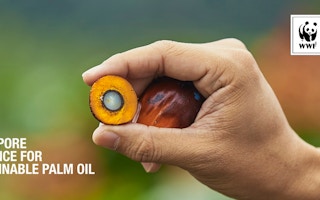WWF Singapore on Monday launched a new alliance on sustainable palm oil in a bid to boost demand for the commodity, and ultimately, help tackle the haze pollution plaguing the region for many decades.
To continue reading, subscribe to Eco‑Business.
There's something for everyone. We offer a range of subscription plans.
- Access our stories and receive our Insights Weekly newsletter with the free EB Member plan.
- Unlock unlimited access to our content and archive with EB Circle.
- Publish your content with EB Premium.
Speaking at the launch of the alliance at Marina Bay Sands on Monday, WWF Singapore chief executive officer Elaine Tan said the alliance “sends a clear signal to consumers about which companies are committed to sustainability”.
“This is a timely opportunity for NGOs and businesses to work together towards transforming the palm oil industry,” she added.
The alliance, which aims to emulate similar networks in Europe that support sustainable palm oil, seeks to connect players in the palm oil industry, retailers and manufacturers to tackle deforestation and haze, said WWF.
The practice of burning peat or forest land, commonly used among Indonesia’s farmers as the cheapest way to clear land, has over the decades caused habitat loss, severe environmental impact and air pollution.
Tan said the formation of this alliance was prompted by the public outcry over last year’s prolonged haze pollution, which hit record highs as it shut down most outdoor activities, and even schools, throughout affected areas in Indonesia, Singapore and Malaysia.
WWF then led a campaign called “We Breathe What We Buy” to raise awareness of the ubiquitiy of the commodity in daily consumer products, and to enlist public support to pressure companies to use only sustainably-produced oil in the making of these goods.
The five founding members of the alliance unveiled on Monday comprise consumer goods giant Unilever, established Singapore manufacturer Ayam Brand, food and beverage specialist Danone, home furnishing retailer IKEA, and Wildlife Reserves Singapore.
Dhaval Buch, chief procurement officer for Unilever, said the company is “committed to working with others to eliminate deforestation”.
“To do this, we need to ensure our own supply chains are fully traceable and certified sustainable and we encourage other industry players to set and meet high standards… The alliance launched today is another great example of a shared initiative to advocate the production, trade and usage of sustainable palm oil,” he added.
WWF added that this alliance complements the efforts of the RSPO (Roundtable on Sustainable Palm Oil), an industry association that certifies sustainable palm oil.
RSPO chief executive officer Darrel Webber, also speaking at Monday’s launch, commended the alliance as putting “action in the hands of Singaporeans”, noting that consumers are the “masters of the supply chain”.
WWF’s Tan added that the alliance is now seeking like-minded organisations to join them. She noted that currently, only a handful of brands carry labels on sustainable palm oil, and the alliance is a way for consumers to identify and support companies that use only sustainable palm oil.
“This alliance can be the solution to our environmental issues. We can support companies on sustainability and haze-free products. Sustainability is the only way forward,” she said.

















